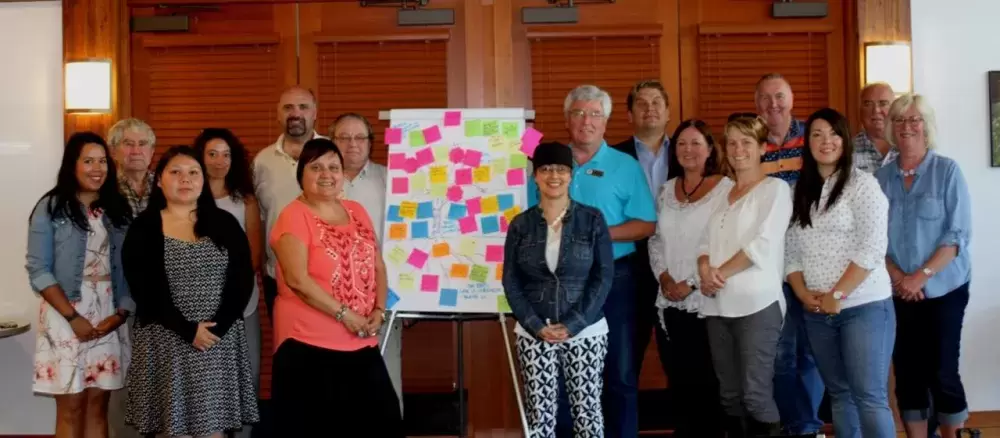“Reconciliation is akin to paddling a canoe. Unless everyone is working together, you are not going anywhere,” said Wilfred Cootes, representing the Uchucklesaht Tribe.
Cootes, along with representatives of the Alberni-Clayoquot Regional District, City of Port Alberni, and districts of Tofino and Ucluelet, sat down June 20th with representatives from the Nuu-chah-nulth Tribal Council, as well as Tseshaht, Toquaht and Hupacasath first nations, to talk about reconciliation.
The day’s discussions included examining what reconciliation means to each of the local governments and the Nuu-chah-nulth Nations, why it is important on the west coast of Vancouver Island, how to achieve it, and what the dangers are if it is not worked on and achieved.
The group even talked about the barriers they might face moving toward reconciliation.
The discussion included how working together—Indigenous and non-Indigenous— increases the power, profile and potential of the region.
“It was a very exciting and encouraging day to begin the journey together on a process of reconciliation,” said Deb Foxcroft, president of the Nuu-chah-nulth Tribal Council. “The process of reconciliation is starting here and now. It’s been a great honour to have everyone’s commitment to spend the day working respectfully together.”
The workshop, held in the Great Room of Tseshaht’s administration building over-looking the Somass River and its multi-million-dollar First Nations’ commercial sockeye run, came one day before National Aboriginal Day, and one year after the Truth and Reconciliation Commission released its 94 Calls to Action on reconciliation; some of the non-Indigenous participants commenting that economic development in the region was a benefit of reconciliation. Most of that sockeye boon is spent in the region, particularly in Port Alberni, supporting local businesses.
“Reconciliation is a process,” said Foxcroft. “It's about truth telling, working respectfully, restoring and doing what we can to redress harm, and making changes, personally and professionally. And it’s about acknowledging, learning from the past, seeing one another with a new understanding and recognizing the need to move forward on a new path.
“Kleco, kleco (thank you) for everyone's courage to be there,” she said.
Facilitated by consultant Jessie Hemphill,the group was taken through the Calls to Action in a PowerPoint presentation. Some of the TRC calls to actions were directed towards local government, but the vast majority are those that local governments can advocate on behalf of, she said.
The group also reviewed the United Nations Declaration on the Rights of Indigenous Peoples, which the federal government, through Indigenous Affairs Minister Carolyn Bennett, said it fully endorses.
Related: See Romeo Saganash explain why that’s not good enough at https://youtu.be/4kwJ-BoXR-U
This declaration will be important legislatively to all levels of government as they commit the time, money and effort toward reconciliation.
“I gratefully gained knowledge of what reconciliation is, and is not, as recognized by the First Nations and Alberni-Clayoquot Regional District participants,” said Penny Cote, ACRD electoral area director for Sproat Lake.
“The group had informative conversation and identified areas that the Alberni-Clayoquot Regional District can begin to take action from the Truth and Reconciliation Commission’s 94 Calls to Action.” Cote thanked Hemphill for the great job facilitating, and the Tseshaht for hosting and providing a delicious lunch.
The status quo is something everyone in the room seemed anxious to leave behind, for improved economic development for their citizens and members, relations free of tension, and for a happier and healthier west coast population.
“This reconciliation workshop was very important to us because it represented a shift in our efforts at the ACRD from a place of education and awareness building, to one of action and implementation,” said Tofino Mayor Josie Osborne, ACRD Chair. “I am proud of the work that the ACRD has done so far, and look forward to continuing this work.”
Ken Watts, Vice President of NTC said “The door is open to reconciliation between Indigenous peoples and the rest of Canada, despite the door being narrow.”
“It is unknown how long it will remain open, but we must walk through that door of reconciliation together. Future generations of Indigenous peoples, and all Canadians, are relying on us to start this difficult work immediately.”
The work also included development of an action plan on what the local governments can do individually to work toward reconciliation, and how they will work together on issues into the future.
Report on the discussions will be made available to the group in the near future.







